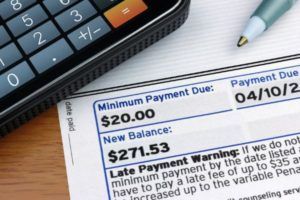The Danger of Making Minimum Payments or Taking Out Payday Loans
 If you are struggling to pay your bills
, you may be tempted to stop paying off your credit cards and make the minimum payments instead. You may also be tempted to turn to a payday loan or another quick fix lender. Both of these temptations can be a dangerous move. Debt can be useful when it is used to invest in the future. But debt eventually needs to be paid off to build net worth. If you’re unable to pay off debt, it’s easy to drop into a debt cycle. And while it’s easy to fall into a debt cycle, it is challenging to get out of one.
If you are struggling to pay your bills
, you may be tempted to stop paying off your credit cards and make the minimum payments instead. You may also be tempted to turn to a payday loan or another quick fix lender. Both of these temptations can be a dangerous move. Debt can be useful when it is used to invest in the future. But debt eventually needs to be paid off to build net worth. If you’re unable to pay off debt, it’s easy to drop into a debt cycle. And while it’s easy to fall into a debt cycle, it is challenging to get out of one.
What is the Debt Cycle?
A debt cycle is a continuous cycle of borrowing that generates more debt, more costs (associated with the debt), and eventual default on the debt. Spending more than you make means going into debt, and eventually, the interest associated with debt becomes a significant monthly expense increasing debt even more. Eventually, some in the debt cycle will decide to take action by taking out loans to pay off the debt or even just to make minimum payments that are past due. Sometimes obtaining a loan to pay off debt can be useful. In some cases, debt consolidation makes sense if it enables the borrower to spend less money on interest and simplify their finances. Still, when the loan is a means of “keeping up” on payments or funding continued expenditures, additional loans will only add to the problem.
Are You In Debt?
If you want to get out of the debt cycle, you must acknowledge that you are in over your head. You have too much debt. Don’t bother with recriminations or guilt; what’s done is done. But to take action, you have to acknowledge where you are and start planning with a realistic view of your situation.
But I’m Okay If I Can Make All My Minimum Monthly Payments, Right?
If you can afford to make all of your minimum monthly payments, you may think you’re fine. However, you are already in the debt cycle. By staying in debt, you are trapping yourself in the current lifestyle. The need to maintain that debt will be a massive limitation as you move through life. Changing careers, quitting your job to care for family, moving, and eventually retiring all become next to impossible as long as the need to maintain the debt continues. While making minimum monthly payments keeps you “current,” it does not pay off your debt; it merely keeps it there as your constant companion.
Minimum Payments Aren’t the Only Danger: Payday Loans
While making minimum payments creates the opportunity for you to have debt as your constant companion for the rest of your life, payday loans create the opportunity for your card table to be ripped out from underneath your house of cards. Payday loans offer instant relief from a pressing need for cash, but most aren’t able to get out from under them. They stick around demanding all the available funds and making it nearly impossible to see your way clear of debt.
Once You Recognize Your Debt Cycle, Start Working on Solutions:
Once you recognize the need to get out of the debt cycle, you can start working on solutions. You may be able to get clear by actively understanding your finances, identifying your income, and controlling your expenditures. Try creating a spending plan to you know how much discretionary cash there is to spend each month (and don’t spend more than you have). Hide your credit cards, so you aren’t tempted to pull them out when you know you’re out of cash in your checking account. Changing your habits little by little can go a long way towards ending the debt cycle for good.
What If Changing My Habits Isn’t Enough to Get Free of Debt?
In some cases, recognizing that you are in a debt cycle and changing your habits to reflect your income isn’t enough to get free of debt. Regardless of why you’re in a debt cycle, now that you’re there, you don’t have enough available funds to pay your bills each month. If this is the case, you may need a more powerful solution.
Ask Your Tennessee and Georgia Bankruptcy Attorney About Filing:
If you have questions about discharging your debt through bankruptcy , please get in touch. Most bankruptcy offices in the Chattanooga area don’t have a single Consumer Bankruptcy Specialist on staff. Our office is the only one in the Chattanooga area with two. You are in good hands with Kenneth C. Rannick P.C.
The post The Danger of Making Minimum Payments or Taking Out Payday Loans appeared first on Kenneth C. Rannick, P.C..











